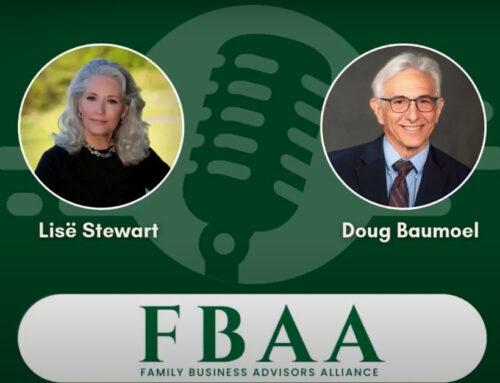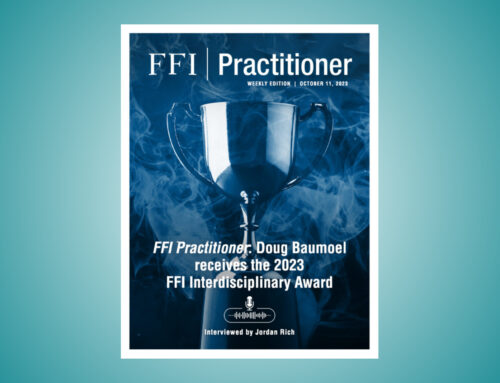When should a family call it quits and go their separate ways? How can a family even think about this painful question? In this podcast, Keith Whitaker speaks with family business consultant Doug Baumoel about these fundamental questions, ones that, from time to time, any family that is managing a business or wealth together have to face. Doug reviews the concept of the ‘family factor,’ which measures a family’s ability to navigate change together, based on shared history, shared vision, and trust. He also talks about ways to raise, in a productive manner, the question of whether to stay together or not, and he shares examples in which families actually found ways to separate without mutually-assured destruction.
Announcer: Welcome to the Wealth of Wisdom podcast. This show is an audio companion to the book “Wealth of Wisdom: The Top 50 Questions Wealthy Families Ask” written by Tom McCullough and Keith Whitaker. The book features insights from more than 50 of the top thinkers and practitioners in the family wealth field. These are the questions your family should be asking. Here’s your host, Keith Whitaker.
Keith: Hi. I’m Keith Whitaker. And I’d like to welcome you to this Wealth of Wisdom podcast. Episodes of this podcast are an audio companion to the book “Wealth of Wisdom: The Top 50 Questions Wealthy Families Ask., edited by myself and my co-editor, Tom McCullough. For this episode, I’m speaking with Doug Baumoel. Doug wrote a chapter responding to the question, “Should you stay together as a family or go your separate ways?” That’s a pretty fundamental question for a book about families with wealth or businesses. So, Doug is the founder of Continuity Family Business Consulting where he and his partner, Blair Trippe, who is also a contributor to Wealth of Wisdom, have developed a process for analyzing key variables of conflict and family enterprise. And they also consult around succession planning and governance in family businesses and family enterprise, more generally. So, welcome, Doug, to the podcast.
Doug: Thank you so much, Keith.
Keith: Great to have you here. So, Doug, I wanted to just jump in, as we do with each of these podcasts, and start with just the question of, well, what is it that you do and how did you find your way into this work?
Doug: Well, thank you for the question. So, what we do is we work with families, typically around important decisions around transitions. And they come to us when they are either stuck, typically, and often in conflict that’s preventing them from moving to a transition, and that could be a generational transition, ownership transition, something like that. Transitions are hard. And our deep roots in conflict management is really a thread that runs through all our work with families, whether we’re working on the org charts, roles for family members in the business and non-family, or ownership issues, or family counsel issues conflict. And our expertise in that area it’s really a thread running through all that work.
But you asked how I got into this field. And that’s sort of an interesting story. I grew up in my own family’s business, a business that was started by my father. I was the heir apparent and I went to engineering school and business school, and really was well prepared, I thought, for a leadership role at the family business. But like many family businesses, we had a lot of conflict. And then my career in the business was sort of fraught. So during the ’80s and ’90s, when I was the most active in the business, we had actually hired family business consultants. Our first consultant was… I don’t know if you know the name Leon Danko.
Keith: Yeah, of course.
Doug: Have you heard of Leon?
Keith: Yeah.
Doug: Yeah. One of the grandfathers of the field.
Keith: Right.
Doug: He wrote many of the earliest books on family business, and I’m always surprised when I go to conferences and see all the people whose lives and businesses he’s touched. So, Leon was our first consultant. And, you know, in the end…and we worked with several others as well. But in the end, we had to sell our business due to conflict. And we actually went into litigation as a family. It was really a nightmare. And selling because of conflict is a terrible, terrible reason to sell At that time, we were using another consultant. And he suggested that because of my decades of experience on the client side of this work, as well as, you know, my background in business and sort of international business…
I was stationed overseas for many years, that I should consider, now that the family business was being sold, I should consider looking at this field, and he thought I could add something to this field, you know, especially, having gone through such an intense experience. So I’d always remained close with Dr. Danko. And in his retirement, he was willing to serve as my mentor. So as I was thinking about getting into the business and wanting to learn more about what it’s like on that other side of the table, consulting to families, you know, it took me two years, a little less than two years, before I actually felt I knew enough to start working with families. And Leon was invaluable in that process.
Keith: That sounds like quite a journey. A lot of pain, I’m sure. But also, you’ve managed to take that experience and turn it into a positive purpose for yourself.
Doug: Yeah, it’s sort of the silver lining to what was a terrible, terrible time.
Keith: Right.
Doug: Yeah.
Keith: But, it does make me wonder, not to get off track with the talking about the chapter, but just based on your story, one of the questions that I often find myself asking myself in consulting with families is, “To what degree just consulting really make a difference or to what degree is the family system unfolding its destiny, whether we make recommendations or not?” And I wonder if, based on your experience, having lived it within your family, how you might respond to that question.
Doug: So, we hired several family business consultants. And I have to say, several of them made matters worse, not better. You know, I think Leon gave us great advice, but we didn’t use him enough to get the value out of that advice. There was reluctance to making a significant commitment to him at that time. Years later, we were bigger. And, you know, we made a more significant commitment to the process. But, you know, the thing that I took away from my experience on the other side of the table was best practices are generally not. We were told all about the three circle model, and we were told all about governance and this and that, but we were unable to actually implement.
And knowing what to do and having help doing it are two different things. And not only having help doing it but overcoming your own internal and group blocks to change is a very, very difficult process. And, you know, I like to think that the lessons I learned from that experience better informed me how to be an effective consultant to the families we work with. You know, right now, we only have about a half a dozen active consultants doing this work that we’ve trained them to do. And we are always…sort of our mantra is, “Are we creating value? Are we helping make change,” not, “Are we presenting smart information?”
Keith: Right, right. So, it sounds like one of the most important things you’ve learned, both from your experience in your family business and from your consulting, is that the best practices, as you said, are generally not and that that can’t just be presented in a vacuum. So I’m assuming you don’t come into consultations with your list of the top five best practices of life.
Doug: No, not at all. Not at all. In fact, I remember Joe Astrakhan. I saw a presentation of his where he basically debunked all of the commonly thought of best practices and identified them. None of them have any basis in statistical analysis. Anyway, so that that’s something that we’re always conscious of, not to go to simple answers because families are complex and every situation is unique. And sometimes the best practice for a family business just hasn’t been written yet.
Keith: Right. Right. Well, I think that’s a good segway to the topic of your chapter because in asking, you know, “Should we stay together as a family or go our separate ways,” I mean, that’s a fundamental question of intention and orientation and really definition as a family that precedes any of these questions of particular strategies, tactics, practices, so forth. So, I’m so glad that you added this chapter to “Wealth of Wisdom,” and so for the sake of listeners who may not have read it yet, could you give a maybe a brief summary of what you cover in responding to that very fundamental question?
Doug: Sure. So, my chapter talks about something that we use in our consulting practice. And that’s the identification of something we call the family factor. And the family factor is the answer to this specific question. And it goes as follows. Is your family bond strong enough to leverage compromise, forgiveness, and a commitment to change? It’s really the most important question that we need to understand the answer to when we work with a family. And it’s not a question we actually ask a family. It’s an observation we make. And we make that from the first call, from when we’re talking to the small group on a chemistry meeting, throughout the process. We’re constantly gauging what is their family factor? And of course, it’s not numeric. It’s sort of qualitative. So we’re trying to gauge what it is, and if we are able to move the needle on it, if we’re able to grow it. And to measure, to get that qualitative feel of what a particular family factor is, we break it down into three buckets, really.
And the first thing we try to gauge is, does this family have a meaningful shared history together? Did they grow up together or did they grow up separately? That’s important, because if they have a meaningful shared history together, and conflict ensues, or differences ensue where they’re thinking about splitting, if the family splits, well, if there’s a meaningful shared history, they have something to lose. Now, that shared history could be very negative, in some cases. It could be positive. To us, it doesn’t really matter. If it’s part of the identity of the stakeholders, that history, then it matters. And maybe it needs fixing or recasting in a new shared narrative about the past. But it’s important and they will lose that if they split.
The second factor is this idea of a shared vision for being family in the future. One of the things we wanna gauge is, is this family staying together until the patriarch or matriarch passes and then they’re all gonna go their separate ways anyway? If that’s the case, they really don’t have anything to gain by doing the hard work of achieving compromise and forgiveness and making change and learning new ideas.
And the third sort of leg of the stool that we use to gauge the family factor is this idea of trust. And we don’t look at trust the way most people experience trust. The way we look at… Well, the way we don’t look at it is, the sort of I-got-your-back trust. I mean, if you want the same things as I do and I like you, I know you’ll have my back, right? And that’s sort of the I-got-your-back type of trust. And that trust, that type of trust, quickly disappears when folks want different things, obviously.
Keith: Right.
Doug: The second type of trust is the ability to feel safe when you’re being vulnerable. Now, families when they fight and want different things, it can get very extreme because what they’re fighting over is very important to them. It’s part of their identity, typically. It’s not like you’re fighting over something, you know, in a non-family business setting. Those things are just not as important. And one of the things we say is, “When families fight, they know what buttons to push because they were, you know, part of putting those buttons in the first place.” So they know how to hurt other family members and they do that.
So when families fight, that feeling safe when you’re being vulnerable type of trust, that goes by the wayside. So the kind of trust we talked about is this idea of predictability. And if you know your fellow stakeholders well and you know how the system works that connects you, you understand the trust, you understand how the business works and how you enter and exit the business, if those moving parts are well known and people are educated in them and they know each other well, then they can begin to make decisions beyond their own personal interests and for the rest or for the greater family because they can predict. They know how the system works and they can work around problems a lot easier. So we gauge that type of trust. How well do these stakeholders know each other and how well do they know the things that connect them?
Keith: It sounds like a really helpful way to break down this notion of the family factor or family orientation, and like in these three areas of history and vision and trust. And so, just so I can follow up and ask about that process, you said that you’re continually engaging that family factor, whether it’s through phone calls, meetings, individual, groups, etc. So how long does it generally take you to get a good sense of the family factor for, let’s say, just a medium-sized family?
Doug: So, I’d say we start getting a good feel after about a month. After about a month we’ve had the initial sort of chemistry meetings where they’re considering us and maybe other family business consultants, and we make it to that stage. And that gives us a sense of how they work together in making that decision of whom to hire and if to hire.
And then we start asking for some documentation, and we sort of gauge how that process goes, and then we start the work. And the work is we go on site for several days. We interview pretty much all the stakeholders, including some non-family, typically. And, you know, the interviews are really open-ended and we ask a lot of questions to get the information that we need. But we also like to let family members talk, just talk about what’s important to them, their relationships growing up, how their relationships evolved. And then, typically on the plane ride back, we always do our work in teams, in teams of at least two people.
So with my co-consultant, we have the opportunity to talk about what each of us have heard, to challenge each other, and that’s the beauty of having a two-person team or more. We can challenge each other and really dig into what is it that we really heard and try on different scenarios of what might explain what we heard. And, you know, talking about the family factor is a core part of that analysis process. When families are hiring us because of specific conflict, I’d say most of the time, it’s not all the time, we will eventually have a conversation about the family factor with the family. But it’s not necessarily a part of the work unless it needs to be.
One family that we’re working with never heard of the family factor. You know, some of them may have read our book but, you know, that wasn’t relevant to the issues that they were dealing with, except when they involved us in a sort of training up the next generation and teaching them what they need to know when they reach adulthood. And we taught them all about the family factor and how important it is to maintain that shared history and build that level of predictability or trust and to take those stories with them of what family means and where family is going because just the next gen can, at a young age… And these were cousins that lived in very different parts of the country. If they can develop a strong family factor, you know, that is the best vaccination against conflict as they move into leadership roles or ownership roles in their family business.
Keith: Right. Right. So it sounds like the family factor, in one respect, is a very powerful kind of guide and a positive guide for strengthening and, as you said, educating the rising generation, giving some direction on how a family can preserve those strengths or increase them. What about in cases where, you know, you’ve started the work and, you know, you might be working on some other topic of succession or governance or the like, and you and your co-consultant come to the conclusion, “Well, the family factor here is pretty remote or it’s maybe kind of depleted.” How do you put that out to the family and what do you do with that then?
Doug: Well, it’s a great question. There has to be a reason for us to bring up this idea of family factor. Again, we don’t present best practices and good ideas for the sake of just presenting. So if we are stuck with a family that people are locked into their positions and they are rigid, we’re not getting a compromise, people are holding grudges and, you know, we’re in a situation like that, we might then teach them about this idea of the family factor. And we might talk about how cut-offs in families…so, you know, cut off are basically when families split with a lot of anger. And they cut off, of course, all communication to the extent that they can. You know, sometimes they’re still connected by events or legal documents or whatever or ownership, but they split. And we try to tell them about the generational impact of cut-offs on families.
One of the things we say is, “If you,” meaning the client, “If you have a cut-off in your generation, the message it sends to your children is that family is disposable and this is how my family resolves conflict. We cut each other out.” Now one day, you, the client, may be on, you know, the conflict end with your own kid or your own brother or sister. And when you start normalizing cut-offs in a family… That’s why when we look at genograms and we map out families to maybe five generations, typically, we look for cut-outs because like other afflictions, like alcoholism or other afflictions in the family, when you see one, you generally see a lot.
Keith: Yeah. So you help the family become more conscious of itself, its history, its way of dealing with conflict, the possibility of cut-offs or actuality of them. One thing that I think it would be very helpful to talk about would be, well, what about in situations where you’ve been doing this work and you come to the conclusion that maybe the family factor isn’t strong enough for the family to achieve a succession plan, a transition, whatever the change or work is that’s going on. You know, how do you put that in front of them?
I ask this in part because my sense is that the way that families approach the work around business or wealth and the way many consultants do in response to their clients is with a presupposition that, “We’re gonna stay together. We must stay together. It’s almost a moral imperative. And not staying together is a failure.” And I’ve seen many families and many consultants get into some really difficult spots under that imperative when maybe the responsible thing was to say, “You know what? Maybe we should go our own and separate ways.”
Doug: Yeah, a very, very good point. We actually always enter into a family system with options. And one of the options is, “Maybe this family is no longer family and they need to understand that.” And in fact, in fact, even at chemistry meetings, you know, sometimes we go to a chemistry meeting and people are sniping at each other and all of this. And on a few occasions, I’ve, you know, sat back in the chair at the conference room and said, “So, we’re family business consultants and it sounds like you’re not a family, and I can’t help you if you’re not.” And if the family responds, “No, we’re just angry at each other or, you know, things, or whatever,” we say, “You know, then there’s hope,” and we can work with them.
But we’ve turned down some cases where at the chemistry meeting they didn’t seem like a family. They just seemed like a collection of strangers that own an asset, and don’t particularly like each other or want to have much to do with each other. It’s just sort of locked in. And sometimes we help them manage some conflict but, you know, that’s not core to our work just because they have the same last name. What we look for is, do they have those three components?
Do they have a meaningful shared history, whether it’s good or bad? Do they have a vision for being family in the future or can we help them create one? And then can we build trust? So you ask, you know, what do we do with these families? We help them build trust with this idea of predictability. We help them really dig into the positive aspects of their shared history or the lessons learned from a difficult shared history. And then we, you know, help them and help actually facilitate in family meetings, family councils, things that will hold them together for the future. But sometimes… Yeah, go, ahead.
Keith: Well, so I was just gonna say, that makes a lot of sense, in terms of you know, where you do have a family but it needs some help in these areas to provide some direction. Is there any cases, beyond the initial chemistry meeting, where you realize that it’s usually not a family, any cases where you’ve found that part of the productive aspect of the work is actually to help a family split up and for people to go separate ways but in a way that isn’t, you know, a complete disaster and very, very, very conflictual or destructive?
Doug: Yes. So I’ll give you a couple of examples. So we are typically called in when the family is stuck or in conflict. When a split is being considered, it’s usually fraught. And that’s why they’re calling somebody from the outside in to help. But, recently we worked with two separate families that had very amicable splits in the past. And these were real estate families. And they were G, 3G, 4 real estate families. Real estate is a very easy asset to split. And that makes the process, you know, much more doable. You can’t split up a manufacturing firm very easily, so then you’re talking about valuations and buyouts.
One family that called us in to help manage conflict, they owned a large hotel. And it was clear that the vision, the corporate vision, of managing this hotel was not… They didn’t have an aligned vision of what they were trying to accomplish as owners of this hotel, owners and managers of the hotel. One of the things that we tried to teach is that owners that have different… Sorry, I should say incompatible visions of what they’re trying to accomplish with their asset, can’t co-own because you’re working across purposes. So either you help them find alignment in some way or they must split because the business will fail if both owners are working towards and both… I should say, and the leaders of the business, the managers, if they’re working across purposes, you’re not doing the business any favors.
Keith: Right.
Doug: And in this particular case, we helped them through a process of selling the asset. And over the years there were some very… Before we got there, there were some very difficult relationships, I think we improved those relationships to the extent that they could be improved and the family is still connected, but they went through trying times before we got there that left a mark. Another family sold their assets. It was a large manufacturing company. If they didn’t sell it because of conflict, they sold it because, well, they weren’t sure.
They called us in to help them make the decision, “Should we sell it and go our separate ways, you know, professionally and economically?” And we helped them through that decision. And that decision was really grounded in it was time to sell that business. There weren’t next gens interest in running it and was a large business. It could have gone on with, you know, good governance and stayed in the family. But we put them to a process where they realized that, “Yeah, time to go.” And the family is connected and all is well.
Keith: Good. Letting go is one of the most important and most difficult things to realize and then do. So, before we let you go and before we turn to kind of concluding this podcast, one other question that I had that your examples made me think of is that you focus mainly on family businesses. So whether real estate or other operating kind of businesses it sounds like. But in your very wide experience, do you have any opinion about the differences between families that are owning businesses versus financial families when it comes to this question of staying together, going apart, or the like?
Doug: Yeah, so more and more, as my company has grown and sort of established itself on a more national scale, we’re working more and more with family offices and families and affluent families on a variety of different issues. No longer is there… Maybe there’s some family office management issues that are the closest thing that I can think of to actually still having the business. But typically, the issues are very different, I’d have to say. The issues are much more about helping families, I’ll use a term from Jim Graubman’s book, how helping families adapt to typically new wealth.
And when I say, “new,” it’s first or second, and maybe third generation, because in those three generations, they’re still learning. They’re still figuring out how to be a wealthy family, how to be affluent, how to retain the values that that family had that were…to help them generate this wealth, how to bring those into this new world where they have wealth and how to retain the drive and the sense of purpose that you need if you’re going to be productive and maybe take that, you know, basically be productive and generative.
Keith: Yeah, it makes a lot of sense. So, there are a lot of questions that I would like to ask. We need to end shortly. But, one thing that comes to my mind is, we started with your observation from your own family experience and experience with consultants about the danger of misusing best practices. Is there any other, you know, one kind of message or piece of advice about this subject of staying together or going your separate ways that you would like to leave our listeners with?
Doug: Yeah. Yeah, I’d say the message would be that conflict is normal in family enterprise. It’s sort of baked into the system. Understanding business interests as distinct and different from family interests is really important. And, you know, too often, the conversation is all around the business assets because they’re easy to value. There’s a number. But when families fight, it’s also easy for the stakeholders to lose sight of the long-term value of family because it’s hard to measure.
And the value, I think, in understanding this concept of family factor, is to be able to gauge that, to have a measure of the importance of family and the ability of that family bond to leverage the things you need to leverage to use to manage conflict in the long term, you know, forgiveness, compromise, and a commitment to change because when families can do that, then the issue of, “Should we stay together? Should we split? Should we sell the business? What are we going to be if we don’t have this business?” All of those questions come into clearer focus when you have this metric, this way to think through and gauge how strong is that family bond.
Keith: Yeah. But, I think another, if I can add one more comment.
Doug: Sure.
Keith: Another use of the family factor here is that, and without trying to turn it into a best practice, that one size fits all.
Doug: Please don’t.
Keith: No, I know. It’s always a temptation, right? But one use of it could also be for families to normalize the strain and stress and toils that are part of family life that are normal to family life and to recognize that no family is perfect and that there’s work to be done. And I think that is also part of what holds families back when they’re facing conflict or a change, a transition, where they’re asking for help, is that belief that, “Well, we should be perfect. We should have everything together,” and not wanting to admit, you know, the challenges. And so I think this is something that can both give hope and normalize the experience of difficulties that you’re [crosstralk 00:33:49].
Doug: Yeah, and it gives them an ability to kinda depersonalize what’s going on and rise above, you know, their own position in a conflict or in a transition decision like that and really use this to get a different perspective to… Yeah, to get a perspective that is more objective and rational.
Keith: Right. Right. Well, we should all hope for so much for our own families.
Doug: Yeah, exactly.
Keith: Well, Doug, this has been a terrific conversation, and I really appreciate your joining the podcast, and, of course, your contributions to the book as well. Thank you.
Doug: Well, thank you, Keith. And it’s really an honor to have been asked to contribute to such a great book. So, thanks for doing that.
Keith: Of course. It’s an honor to have you. So, and I wanna thank our listeners as well for listening to this Wealth of Wisdom podcast. And of course, if you’d like to hear the many other podcasts that we have produced or to order the book “Wealth of Wisdom,” please, visit our website, www.wealthofwisdombook.com. Thank you so much.
Doug: Great.
Announcer: Thank you for listening to this episode of The Wealth of Wisdom podcast with Keith Whitaker. Visit us online at wealthofwisdombook.com. At the website, you’ll find more information on the book, including free downloadable preview chapters and podcast interviews with the majority of the contributing authors.
Related Posts
About Us
Continuity Family Business Consulting is a leading advisory firm for enterprising families. Using a full suite of service capabilities, we help families prevent and manage the single greatest threat to family and business continuity: conflict. It is through this lens that we advise our clients and build customized strategies for succession planning, corporate governance, family governance, and more. We help families improve decision making, maximize potential and achieve continuity. To inquire, contact us.












